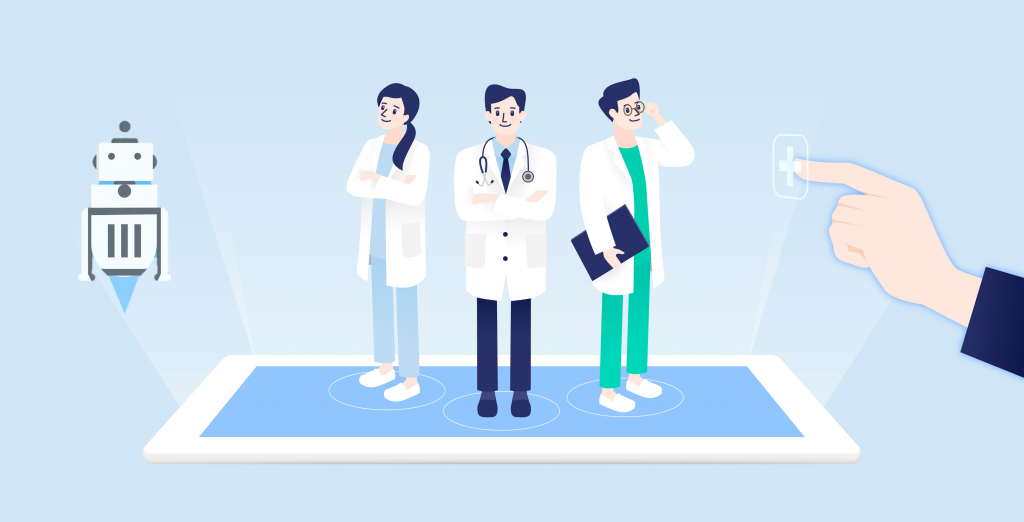
In his 2015 TedTalk, Bill Gates pointed out that even with all those technological advancements, we are very far from being able to confront any severe global outbreak. Five years later, what he said turned out to be the absolute truth. Covid-19 has left every single country in the world in shock, with overloaded hospitals and insufficient human resources. Medical scientists are still in their labs to find a cure for this unheard-of virus.
Among so many other lessons, we ensured that investing in healthcare tech is something we should prioritize. Because at the end of the day, what has helped millions of doctors and people around the world were health tech innovations like teleconsultation, online pharmacy, telemedicine, and the entire IT-tech ecosystem built for the healthcare sector.
Furthermore, with overloaded hospitals across the globe, conversational AI (aka chatbot) has also contributed significantly to handling this whole situation. However, many people do not favor investing more in the further development of this technology. The primary reasons behind this are that humans are better than chatbots, the capabilities of chatbots are very limited, and the like. There is no doubt that humans overperform Conversational AI in general, but there are certainly several areas where they have been proven better. Back in the day when computers were first introduced, they were not as advanced as they are now. As time progressed, computers became better and better. Chatbots are expected to experience a similar process as well.
This blog post will walk you through 6 aspects of chatbots that can significantly help the healthcare industry.
24/7
There are limitations to human capacity as well. One is that we require a certain amount of sleep every single day. Without it, we will not be able to function fully and can’t even survive in the long run. In contrast, it is not the case with chatbots at all. Which we consider a very significant factor in healthcare. People can fall sick anytime and seek medical assistance. So 24/7 available chatbots are needed the most here.
Low cost
Indeed, what many healthcare providers do is hire several employees and assign them to day and night shifts so that customers can reach them at any time. Yet, the reason why it is not a good idea is that it is costly. It is immeasurable how much chatbots can be financially efficient. Despite the fact that hospitals or clinics rarely financially suffer, money can always be spent on something more substantial.
Simultaneous responses on multiple platforms
Most of the time, what happens when we want to reach out to hospitals or healthcare providers, in general, is that we have to wait until the next available agent responds. Or we are told how many people are in the line waiting to connect. And that is probably the worst queue you ever have to get into because either you or someone close to you is in need of immediate medical assistance. With Conversational AI running on multiple platforms, people will never have to encounter that anymore. Integrating one chatbot handles all the inquiries coming from every single channel simultaneously.
Faster in going through a large database
Humans are the ones who invented all the technologies in the humans are the ones who invented all the technologies in the first place. We have not done it so that they would just stay there. Instead, we should utilize them wherever necessary. Even though our technologies are incompatible with the human brain, handling large data is something AI is better at than doing it with human eyes. In the case of medical institutions, time is a crucial factor in many situations. Thus, instead of having our employees go through the database and provide responses to clients, letting Conversational AI do the job is suitable for both sides.
Multilingual
With rapid globalization, people can speak more languages. Therefore, knowing English has become somewhat the norm. However, it is not easy to communicate your medical condition to your doctor in a foreign language. Terminologies used in this industry are complex and hard to memorize. With Chatbots equipped with NLP (Natural Language Processing) technology, people can conveniently get their messages through in their own language and even dialect.
Customized experience
Many people argue that customer experience in the healthcare industry is not as important as it is in other sectors. It might be valid to some extent, but imagine if you connect to your health provider through conversational ai and get what you need in minutes. That would undoubtedly make a difference. ML (machine learning) and IA (Intelligent Analysis) technologies do just that. They learn from past experiences, store them in the big data and use them whenever needed. In fact, this is another area where chatbots mostly overperform their human counterparts.
Successful chatbot solution in the industry
Makebot-H by Makebot is a solution in the South Korean market that has been in use in over hundreds of hospitals and medical clinics. Since it was initially launched in the Korean market, the service has been offered on KakaoTalk, Korea’s number one messaging app. According to statistics, Hospitals with Makebot-H have been receiving 80% of bookings through chatbots resulting in time and money efficiency. Makebot-H can also be offered in more than +20 languages and multiple channels like WhatsApp, Facebook Messenger, Line, etc. Please leave your contact information here for more information, and we will contact you shortly.
On a final note
It is true that chatbots are nowhere close to competing with humans, and they will never be able to function like us fully. However, with what they can offer now and the progress they are expected to make in the future, we can help reach out to millions of people. In times like this, the healthcare industry suffers the most. Therefore, conversational ai should be taken seriously and implemented accordingly to provide better healthcare support for society.